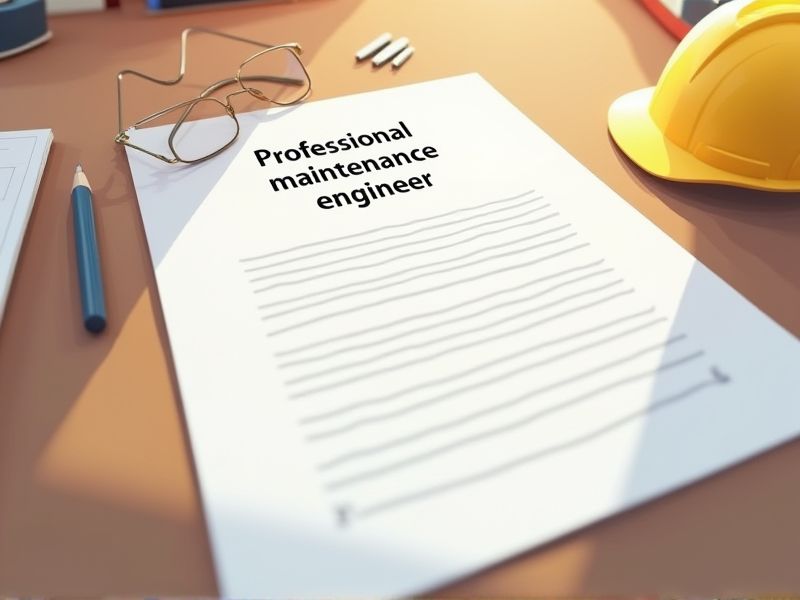
Professional maintenance engineers face complex challenges that necessitate a strong foundational knowledge in their field. Certification programs provide a structured way to gain specialized skills, ensuring engineers are equipped to handle a variety of technical issues. Furthermore, certifications often signify a commitment to industry standards, which enhances professional credibility and career advancement opportunities. Explore these essential certifications for a professional maintenance engineer.
Certified Maintenance & Reliability Professional (CMRP)
Obtaining the Certified Maintenance & Reliability Professional (CMRP) credential signifies a mastery of industry standards, directly enhancing a maintenance engineer's professional credibility. The certification ensures familiarity with established best practices, leading to improved equipment uptime and reduced operational costs. Formal recognition of skills often creates more career advancement opportunities within organizations that value technical competence in maintenance and reliability. The standardized knowledge from CMRP helps engineers to effectively implement preventive maintenance strategies, minimizing unexpected breakdowns.
Certified Reliability Engineer (CRE)
A Certified Reliability Engineer (CRE) enhances a professional maintenance engineer's capability by providing expertise in reliability principles, which reduces downtime and maintenance costs. The CRE designation signifies a deep understanding of risk assessment and management, vital in ensuring equipment and process longevity. Maintenance engineers with CRE certification are skilled in advanced problem-solving techniques, improving overall system efficiency. Employing a CRE-certified professional helps in predictive maintenance, potentially preventing failures and enhancing operational safety.
Certified Asset Management Professional (CAMP)
Certified Asset Management Professional (CAMP) enhances a maintenance engineer's understanding of effective asset management principles, improving decision-making processes. It provides engineers with a structured framework to optimize resource allocation and extend asset life. This certification differentiates professionals in a competitive field, signaling their commitment to best practices and continuous improvement. The accreditation often leads to increased job opportunities and potential for career advancement due to recognized expertise.
Maintenance Planning and Scheduling Certification
Earning a Maintenance Planning and Scheduling Certification enhances a maintenance engineer's ability to efficiently allocate resources and time, reducing operational downtime. Certification ensures a standardized understanding of best practices, which translates to improved asset reliability and longevity. Employers value this certification, often leading to career advancement and increased job opportunities. Certified engineers are better equipped to implement cost-effective solutions, optimizing maintenance budgets and elevating organizational performance.
Certified Industrial Maintenance Mechanic (CIMM)
A Certified Industrial Maintenance Mechanic (CIMM) brings a standardized level of technical skill and knowledge, enhancing the overall competence of maintenance teams. By possessing a CIMM certification, maintenance engineers can ensure adherence to industry best practices, thereby reducing equipment downtime. This certification validates a mechanic's expertise, leading to improved safety and efficiency in industrial environments. The presence of certified professionals often results in cost savings by minimizing unplanned repairs and increasing equipment reliability.
ISO 55000 Asset Management Certification
ISO 55000 certification provides a standardized framework for asset management, which is crucial for maintenance engineers to ensure optimal asset performance and reliability. The certification helps in systematically reducing risks associated with asset failure, thereby extending the life and efficiency of machinery. Engineers with this certification are equipped to implement cost-effective and sustainable maintenance strategies that align with organizational goals. Being certified enhances an engineer's credibility and opens up opportunities for career advancement in asset management roles.
Project Management Professional (PMP)
Possessing a PMP certification equips a professional maintenance engineer with structured project management skills, leading to improved efficiency in managing maintenance projects. This qualification enhances their ability to meet project deadlines and budgets, resulting in cost-effective operations. With PMP certification, engineers gain a competitive edge in the job market, increasing their career advancement opportunities. The structured methodologies learned benefit team collaboration and stakeholder communication, thus fostering successful project outcomes.
Six Sigma Green Belt
The Six Sigma Green Belt equips maintenance engineers with tools to identify and minimize process variability, leading to reduced downtime and improved equipment reliability. By integrating data-driven decision-making, engineers can optimize maintenance schedules, enhancing operational efficiency. Training in Six Sigma methodologies promotes a culture of continuous improvement, crucial for maintaining competitive advantage. The qualification enhances problem-solving skills, allowing engineers to address complex maintenance challenges more effectively.
Lean Manufacturing Certification
Lean Manufacturing Certification enhances a maintenance engineer's ability to identify and eliminate waste, leading to more efficient operations. By mastering lean principles, engineers can improve production quality and reduce downtime, which increases reliability and output. Certification provides a standardized understanding of lean methodologies, which fosters better collaboration and communication within multidisciplinary teams. With Lean practices, maintenance engineers contribute to cost reduction and streamlined processes, giving a significant competitive advantage to organizations.
Certified Facilities Manager (CFM)
Certified Facilities Managers possess a deep understanding of best practices, which enhances the operational efficiency of maintenance teams. Facilities that employ CFMs tend to experience fewer maintenance-related issues due to their strong focus on preventive measures. CFMs bring leadership and strategic planning skills, essential for aligning maintenance activities with organizational goals. Hiring a CFM often leads to reduced costs and improved asset longevity, as they implement data-driven maintenance strategies.
Summary
When you acquire certifications as a professional maintenance engineer, your credibility significantly increases among peers and employers. This enhanced credibility often leads you to access more competitive job opportunities and potentially higher salaries. As your skills become further validated, you may experience improved job security and career progression. The certifications also enable you to handle complex maintenance tasks more efficiently, impacting overall operational effectiveness positively.
